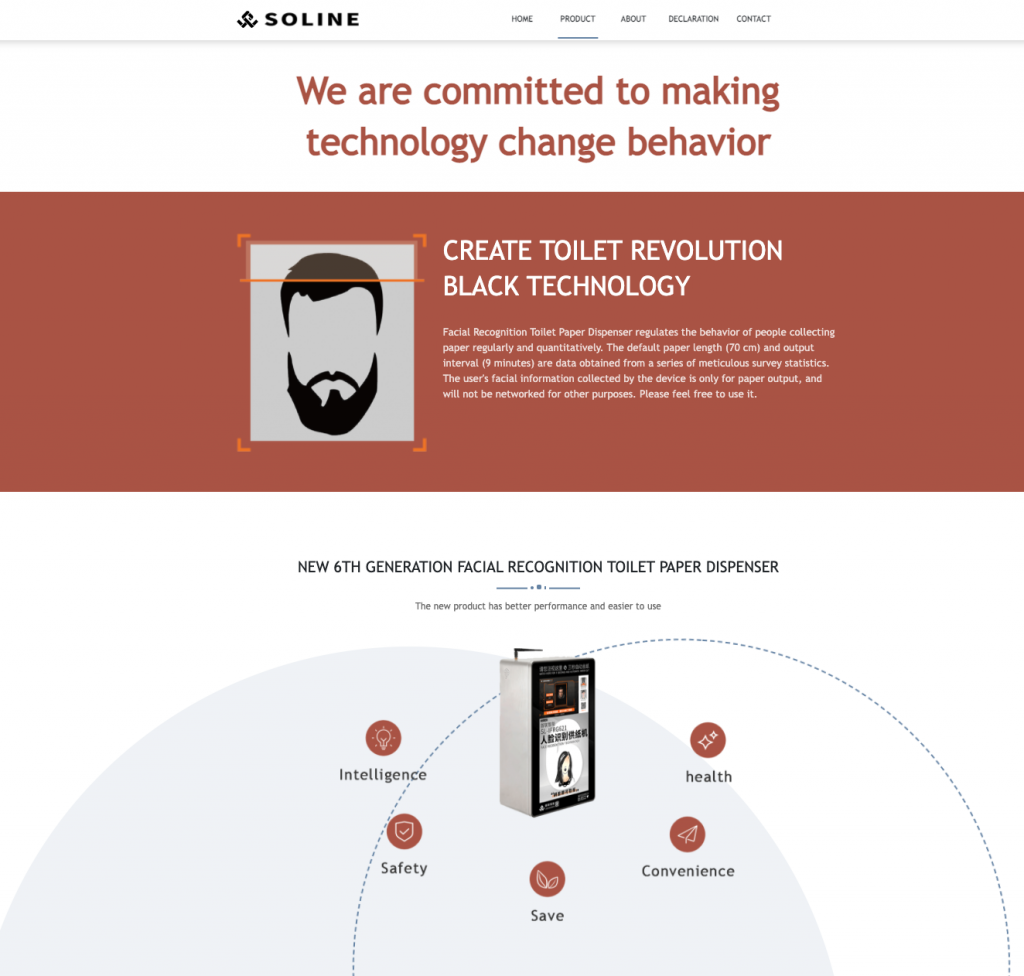
Face Recognition, available on wikimedia commons under CC license.
The key message to emerge from the most recent “collective study session” of the CCP Politburo was a simple one: security. At the session, held on December 12, Xi Jinping stressed that a renewed emphasis on security was mandated by “the historical position of our country’s development and the situation and tasks facing national security.” This, he said, followed the “Decision” released by the Fifth Plenum in October, which marked the first time that “integrating development and security” (统筹发展和安全) had been included in a five-year plan for economic development.
The Chinese Communist Party has long been obsessed with security, and all forms of security are closely tied to maintaining the stability and legitimacy of the regime itself. But we seem, midway through Xi Jinping’s second term, to be in the midst of a heightened period of security consciousness.
Among the burst of security related catchphrases emerging from the December 12 session, we find “building a big security structure” (构建大安全格局), “adhering to the organic unity of political security, people’s security, and the supremacy of national interests” (坚持政治安全, 人民安全, 国家利益至上有机统一), and “fully using the national security policy toolbox” (用好国家安全政策工具箱). Taken together, they suggest that Chinese leaders are viewing policy concerns across the board in China through the lens of national security – premised, perhaps, on a deepening sense of insecurity.
As the leadership pursues its broadening definition of national security, one integral part of the security toolbox is certainly the use of big data and technology, including such tools as facial recognition. But this renewed emphasis on security also comes at a moment when there has been more engagement with the issue of personal data security within Chinese society.
A landmark case in November, coming just two months after the “largely overlooked” release in September of a new Draft Data Security Law, ruled that it was illegal for the zoo in the city of Hangzhou to collect facial biometric data from visitors without their consent. And there has recently been an uptick in stories from Chinese media about the widespread and unwarranted application of technologies like facial recognition. The news in late November that real estate companies had secretly been collecting information on clients using facial recognition sparked widespread anger.
Several cities, including Tianjin and Nanjing, have already ordered curbs on public applications of facial recognition technology, responding to growing public concern. In a survey released a year ago by Guangzhou’s Southern Metropolis Daily newspaper, more than 70 percent of respondents expressed concern that personal biometric data gathered through facial recognition technology in public places could be leaked and abused.
One of the most absurd recent cases to gain attention in the Chinese media recently was a viral video posted earlier this month in which a man enters a real estate exhibition wearing a motorcycle helmet with a visor in order to evade facial recognition cameras. But the discussion over security and the application of new technologies reached new heights of absurdity this past week as a number of Chinese media reported that facial recognition technology is being used even to regulate the use of toilet paper in public toilets across the country – in train stations, in malls, and at tourist attractions.
Interestingly, one of the key suppliers nationally of facial recognition toilet paper dispensers is SoLine Technologies Co., Ltd., a “high-tech enterprise specializing in biometrics” that is now selling its sixth-generation facial recognition toilet paper dispenser – but is based in Tianjin, a city that recently introduced restrictions on such uses.

As new technologies have been integral to CCP thinking about a range of issues concerning regime security, including the adoption of “convergence” to reconsolidate controls over the media, the intersection of security objectives and data privacy concerns in China will be a key issue to continue watching.
In the meantime, the following is CMP’s translation of a recent report on facial recognition toilet dispensers from the Qianjiang Evening News (钱江晚报), a spin-off of Zhejiang’s official Zhejiang Daily. Similar reports across China have provoked a response, and the city of Dongguan recently announced that it was ending use of the machines.
_________________
Facial Recognition Also Used for Toilet Paper in Public Toilets? Hangzhou East Railway Station Responds: [Data] Deleted Automatically After 10 Minutes
December 17, 2020
Facial recognition is already being widely used in our lives. From the level of smart cities (智慧城市) down to the level of unlocking our mobile phones, we readily see the shadow of facial recognition technology.
However, while this new product of the internet era brings people convenience, it also prompts new uneasiness – there are more channels by which users’ faces, physical movement and other sensitive information can be leaked.
Recently, owing to the fact that some property owners were using facial recognition for [residential] community access, there was a great deal of attention in society [to the issue of privacy], and this became a hot topic. Subsequently, reporters for the News Hour column at Qianjiang Evening News carried out investigations and visits on the application of facial recognition technology in many contexts in the city of Hangzhou – including over the question of whether there might be risks in the storage and management of facial recognition data in the back-end of these applications.
Over the past two days, many netizens have reported to News Hour: “It’s not only out in the community,” [they have said.] “Now, you even have to submit to a facial scan to use toilet paper!”
The photo sent by one netizen showed a “facial recognition toilet paper dispenser” (人脸识别供纸机) at the entrance to the public toilet at Hangzhou East Railway Station. The Qianjiang Evening News reporter decided to head to the scene to find out more.

The Reporter’s Observations
At the entrance to many public toilets at the Hangzhou East Railway Station, the reporter saw the “facial recognition toilet paper dispensers” to which the netizen had referred.
These machines were generally placed in less conspicuous positions on the walls outside the entrances to public toilets.
The reporter observed that there were only a small number of people who came by to use the machines. Waiting near one of these machines for about 15 minutes, there were just two people who came up to use them – and it should be understood that the public toilets in the Hangzhou East Railway Station are get very high use.
The process of getting toilet paper is quite easy. Users show their face to the screen on the machine, standing still for three seconds, and a ribbon of tissue from 60 to 100 cm in length, about 8-10 squares, is dispensed from the machine. According to design, if the same user attempts within a few minutes to scan their face again, the toilet tissue will not be dispensed.
This is the a core feature of the machine – that it can save on the amount of paper dispensed within a short period of time, and in this way conserve paper.
One woman who went through the facial scan and received her toilet tissue told the reporter: “I do have this question of whether my facial information, once its inside, will somehow be misused.”
But there are also other voices.
Among the cleaning ladies working in the station, quite a few say they use the facial recognition dispenser to get toilet paper. One of them said to the reporter: “This is really convenient! Where is my facial information? I don’t know, but I don’t really care!”
Mr. Liu, a traveller, said he was not eager to try out the machine: “Where does the facial recognition data go?” he asked. “Will it be stolen?”
East Railway Station Employee: The Original Idea Came from a Netizen, and Was Intended to Save Paper
Next, the reporter interviewed an employee for the East Railway Station.
The employee told the reporter that these facial recognition toilet paper dispensers were installed two years ago with the renovation of public toilets in the station.
Why were they installed? This was the process . . .
Originally, Hangzhou East Railway Station provided toilet tissue free of charge. After this approach was implemented for a time, the station discovered that the tissue was being used at an astonishing rate, in some cases a large roll of tissue not lasting more than 10 minutes before it was “entirely used up.” In many cases, the paper was not just used in the toilet, but was carried away by people. Moreover, there was no way for the station to stop the practice, considering that [the tissue] was taken from toilet stalls.
However, if the station chose not to provide toilet tissue, this might be a great inconvenience to travellers.
So finally, on Weibo, one traveller made a suggestion to Hangzhou East Railway Station, that they might install coin-operated toilet tissue dispensers. After considering this, the station felt that as their role was to serve everyone, this approach using a coin-pay system was too commercial. Another suggestion was to use the facial recognition machines instead.
The facial recognition toilet paper dispensers currently installed in Hangzhou East Railway Station are all manufactured by Tianjin’s Soline (天津首联). Station staff told the reporter that Soline said the machines did not collect facial information, and the information collected was not connected to the internet.
Product Manufacturer: Facial Recognition Dispensers Use ‘Short-Term Recognition’, and Deletion is Made Within a Limited Period
Immediately, the reporter contacted Soline. Staff there said that the capture of facial information by their machines works by recognition only of a few facial points. Once the scan is made, [the data] is stored in memory for a short time. When a user scans their face again, the machine compares these data points, and if repetition is found the machine will not dispense paper again within 9 minutes (a factory setting). After 10 minutes the machine will delete previously stored facial data. Moreover, the company also pledges that it will not consider storing the personal facial data of users in the future.
Staff at the company said Soline had entered Hangzhou in 2018, first installing its machines in public toilets around Lingyin. To date, in addition to public toilets in scenic areas and railway stations, the company’s facial recognition machines can be found in shopping malls.
The reporter was also able to locate the inspection report from the Ministry of Public Security that Hangzhou East Railway Station had mentioned.
The inspection report issued by the Ministry of Public Security’s Electronic Product Quality Inspection Center for the toilet tissue dispenser noted that the prototype had a facial data collection function and could automatically delete data storage within a set time. The inspection result found that the machine met requirements.
Despite this, when it comes to the collection of bioinformation, the law clearly stipulates that this adhere to the principles of legality, propriety and necessity.
How do you view the use of facial recognition for toilet paper dispense? You’re welcome to scan the QR code and join the conversation at News Hour.




















